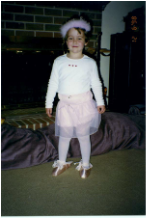Being able to say you are officially done treatment, and are a survivor, does not necessarily equal happiness. For me, this could not have been more true. After I finished my relapse treatment, I had beaten cancer twice so should have felt exceptionally happy to be alive. But, I had missed so much school and so much of my adolescent life that I felt cheated. I felt like something had been stolen from me and I would never get it back. Sure, I went to school and tried to return to normalcy. However, it didn't work that easily. I struggled to fit in with my peers because I had just lived in a high-intensity world of medicine, full of strict routine and millions of rules, while they were living life full of excitement and without inhibitions. How does one learn to be a teenager again? How do you learn not to panic when sharing food at the lunch table, or standing next to someone who is coughing? How do I explain to my classmates why I can't run so fast in gym class? How am I supposed to feel good about myself when I am all kinds of overweight from treatment, but surrounded by toned and tiny teenagers? How do you save your mind from all those questions and worries without a little help?
I had to figure all of that out on my own, but no other survivors should have to. And I write this blog as a step towards making that possible. However, if you find yourself lost in that spiral of confusion and concern, take action. Check out this page on the National Cancer Institute Website for information on mental health issues related to cancer treatment and survivorship: HERE. Additionally, don't hesitate to contact a mental health professional if you are struggling. Cancer.net has an awesome outline of the kinds of mental health professionals that can assist cancer patients/survivors if you are unsure of who to contact.
Maybe someday soon the oncology world will get the hint that there is more to treating cancer than treating the disease itself, and that returning to life after treatment is not always a joyous venture. It does not take a rocket scientist to realize that putting a human being through a near-death experience will likely result in some anxiety and emotional instability.
Fortunately, it seems patients are taking things into their own hands, and through articles like Cindy Finch's, are beginning to raise awareness about the importance of saving a cancer survivor's mind.



 RSS Feed
RSS Feed

